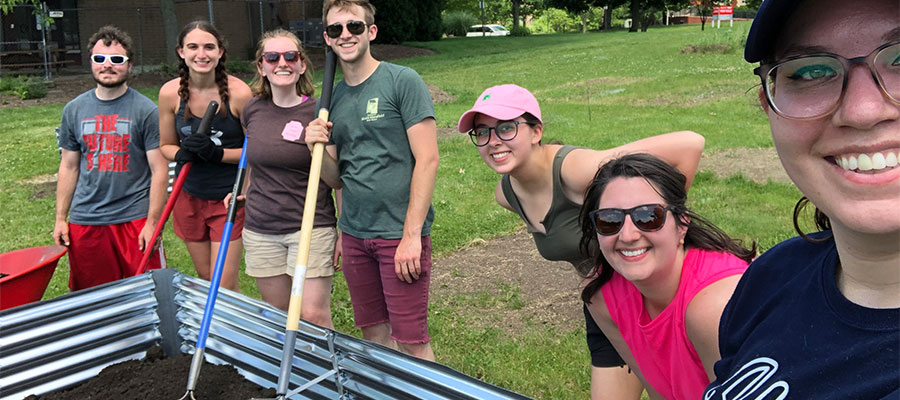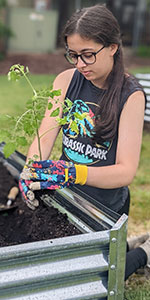 by Jessica Whitehill
by Jessica Whitehill
Sure, a garden is a patch of land used for growing vegetables, herbs or flowers. But it’s also commonly defined as a place for public gatherings—such as New York’s Madison Square Garden.
Here at The University of Akron (UA), both definitions apply.
On the site of a former fraternity house, across from a local church, sits an urban oasis that not only provides fresh produce for students in need, but serves as a gathering place for learning and growing relationships.
Located on the edge of UA’s campus, the new Community Garden became a hotbed of activity this summer when Alison Doehring, director of ZipAssist, facilitated an [Un]class called Zips Grow Together.
“An [Un]class is a short-term class for students that is designed to help them learn and hone practical skills—like resilience, creative and innovative thinking, flexibility, teamwork and risk-taking—versus achieving specific topical knowledge,” said Dr. Christin L. Seher, co-director of the EX[L] Center for Community Engaged Learning, which is the home of the [Un]class program.
The EX[L] Center, led by Seher and co-director Anoo Vyas, seeks to help students emerge from UA as civically engaged, adaptable leaders who are ready to join in the enterprise of building strong and sustainable communities.
[Un]classes cover a variety of topics. For example, during the fall 2022 semester, the EX[L] Center offered an [Un]class on the topic of human trafficking with the goal of hosting community events to share information about the issue.
Courses are open to community members who may enroll for a reduced fee and learn alongside UA students and faculty. While they don’t earn academic credit, community members will receive a certificate of completion.
In the case of Zips Grow Together, students started with a discussion about food insecurity on campus and asked how they could create a space that not only helped provide fresh, affordable produce, but do so in a way that supports the mental health of all students and strengthens the Zips community.

Hoes, Rakes and Shovels
Work to prepare the Community Garden started last summer when students in the [Un]class got to work mixing concrete alongside UA’s grounds crew and physical facilities staff. The students hauled dirt and mulch with administrators and staff from academic disciplines, units and offices they typically wouldn't have interacted with, and were taught by students from the Urban Agriculture club.
Seher said the land on which the garden is located originally belonged to the club, which didn’t have the resources to fully develop it. Seher and Doehring knew the space had a lot of potential, and several pieces fell into place that quickly turned the garden into reality.
After the club turned over the land to ZipAssist, an office on campus that serves as a central information hub and provides support and assistance to help students be successful at UA, the [Un]class was developed. Funding for some of the supplies and equipment needed to start the garden were donated by an individual who has been supportive of student services in the past, Doehring said.
Harvesting a Good Crop
There is something poetic about the garden to table concept: “Food that is literally grown at UA is given to students who need it through the Campus Cupboard program, which provides non-perishable food and hygiene items to any UA student who is in a financial pinch,” said Doehring.
The first crops, including sweet cherry tomatoes, were harvested and went to the Campus Cupboard just as students returned to campus for fall semester. 
“But the garden is about more than just food,” Doehring explained. For example, the Department of Biology will be installing four raised beds so students can study how bees interact with pollinator flowers. They also installed two beehives in the garden that will be used for research. And students from Myers School of Art will be creating a series of signs for the space.
Even now, work on the garden continues with the help of an army of volunteers. Faculty and staff, who have either a green thumb or a desire to help, are stepping up. Even students from local high schools pitched in as part of their summer service program.
“We will continue to have ad hoc volunteer days to ask people to help with weeding, planting and moving mulch and dirt,” said Doehring. “Upkeep and continual maintenance will be a community effort. We hope students, groups such as Urban Agriculture club, and local residents will dig in going forward.”
Helping it Flourish
Lastly, since the garden was started with the support of a donor, Doehring said she hopes other donors might have an interest in the space—not only to maintain it, but also continue to enhance it with more beds, benches, flowers, birdhouses and windchimes.
“Donations can give some solid footing to the garden that would help it grow and flourish in a positive way,” Doehring added.
And thanks to the EX[L] Center and its [Un]class program, the University’s connections to the Akron community will also continue to grow and flourish.

Formal Engagement
The EX[L] Center for Community Engaged Learning’s role is to think intentionally and strategically about ways to connect and embed opportunities for public impact across the student and faculty experience.
The Center does this by supporting community-based teaching, research and service that leverage and recognize the strengths of both the campus and the community.
In that spirit, alongside partners from across Akron, the Center is co-creating an innovative 12-credit Certificate in Applied Community Engagement. The program, which will be launched soon, is designed to build civic identity and give students an opportunity to make an even greater impact while they pursue their degree at UA.
The Center held a summer institute in July, during which 15 community leaders collaborated to co-create the curriculum. Christin Seher, co-director of the EX[L] Center, believes the program is one of a few of its kind in the country.
The certificate program, which can be integrated into any academic degree program, will help students grow their skills in creative thinking, communication, compassion, equity and justice, and partnership-building, while learning from a diverse array of community partners.
Seher noted this is a certificate program for Akron, by Akron. And when it comes to community collaboration, the EX[L] Center and The University of Akron are always ready to be involved.
